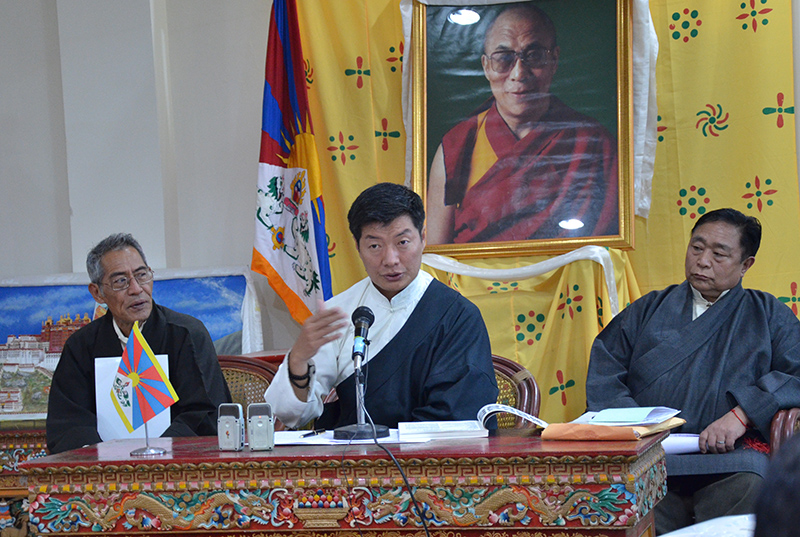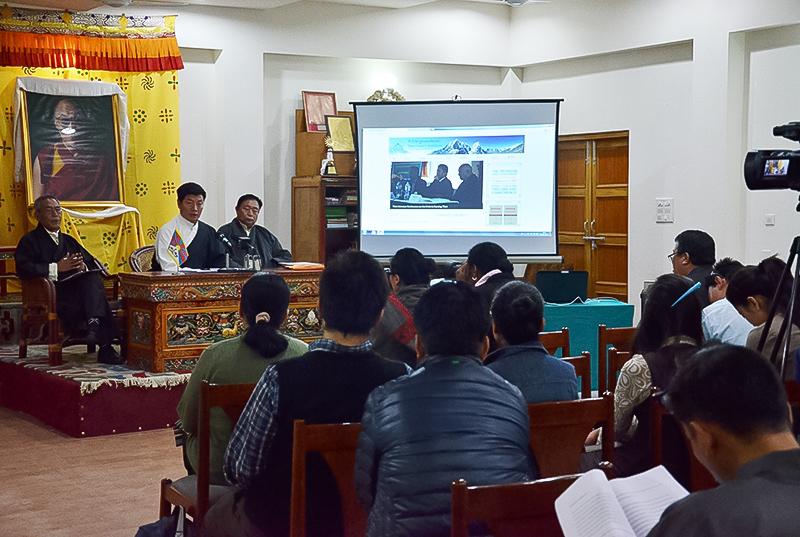 Dharamshala: — Speaking at a Kashag Hall news conference on Wednesday, 16 April, Sikyong Dr Lobsang said: 'the most powerful portfolios in government bodies in Tibet are almost always held by Chinese nationals.
Dharamshala: — Speaking at a Kashag Hall news conference on Wednesday, 16 April, Sikyong Dr Lobsang said: 'the most powerful portfolios in government bodies in Tibet are almost always held by Chinese nationals.
A new website of the Tibet Policy Institute, (www.tibetpolicy.net) a think tank of the Central Tibetan Administration based in Dharamshala, India was luanched by Sikyong Dr. Sangay. He also launched a book titled 'Current Leaders inside Tibet' compiled and published by the Tibetan think tank. The book is currently available only in Tibetan.
"Due to the widespread use of internet and digital connectivity, we are launching this new website to create more awareness about what is happening inside Tibet to the outside world," Sikyong said, adding: "As more and more people around the world get connected through the websie, I believe this website would become an effective tool to disseminate factual information about Tibet."
Sikyong said that "this website will publish as much research-based articles and journals written by our researchers to dissipate the distortion of facts spewed by the Chinese propaganda machinery."
"Truth is on our side but sometimes we find it difficult to indulge in an intellectual debate on Tibet with Chinese nationals. Most of the Chinese people are deeply entrenched in a pre-concieved notion about Tibet based on information provided to them by government-backed news media," Sikyong said when explaining the complexities of discussing Tibet with Chinese people.
"Therefore, whenever we talk about Tibet, we refuse to budge from our pre-conceived notions, which eventually results in an impasse. So, it would be more effective if we talk to them on an intellectual and fact-based correspondence based on intensive research," he added.
Speaking about the book, Sikyong Dr. Sangay told the reporters that the book is a compilation of information on the current leaders inside Tibet and the discriminatory polices practiced by the Chinese government in these Tibetan areas.
"The book documents the leadership structure in Tibet and the number of Tibetans vis-à-vis Chinese nationals within these organisational bodies. It would be interesting to know that the most powerful portfolios in these bodies are almost always held by Chinese nationals. Even the number of Tibetans in these leadership bodies are kept to a minimum," he stressed.
Mr. Thubten Samphel, Executive Director of Tibet Policy Institute, in his remarks, said the new website will serve as a repository of research works published by the think tank. It will try to create a virtual platform for intellectual discussion on Tibet.
 Since its establishment in 2012, the Tibet Policy Institute has been carrying out comprehensive research works on all aspect of Tibet-related issues which would help the Tibetan administration in framing policies and making the Tibet issue a competent case on the international platform.
Since its establishment in 2012, the Tibet Policy Institute has been carrying out comprehensive research works on all aspect of Tibet-related issues which would help the Tibetan administration in framing policies and making the Tibet issue a competent case on the international platform.
The institute said they also has 'published various books and literatures on Tibet including a number of white papers in response to China's white papers on Tibet.' The institute said it 'seeks to make Gangchen Kyishong, the seat of the Central Tibetan Administration in Dharamshala,' as an "Intellectual Hub".
Sikyong Dr Sangay has emphasised the need to have competent researchers at the think tank and called on the researchers including the staff of the Tibet Policy Institute and other CTA officials, to best develop the know how and their interests in research works on issues relating to Tibet. Therefore, the researchers at the think-tank are continuously trained by leading research institutes around the world including EURAC (European Academy of Bozen/ Bolzano).
Some of the major activities of the think tank include organising conferences, monthly talk series, publishing annual journals including re-joinders on Tibet and Tibetans in national newspapers. Top researchers from India and abroad are also invited to hold monthly and annual debates and symposiums to hone the skills and knowledge of the Tibetan researchers.


![Tibet has a rich history as a sovereign nation until the 1950s when it was invaded by China. [Photo: File]](/images/stories/Pics-2024/March/Tibet-Nation-1940s.jpg#joomlaImage://local-images/stories/Pics-2024/March/Tibet-Nation-1940s.jpg?width=1489&height=878)















